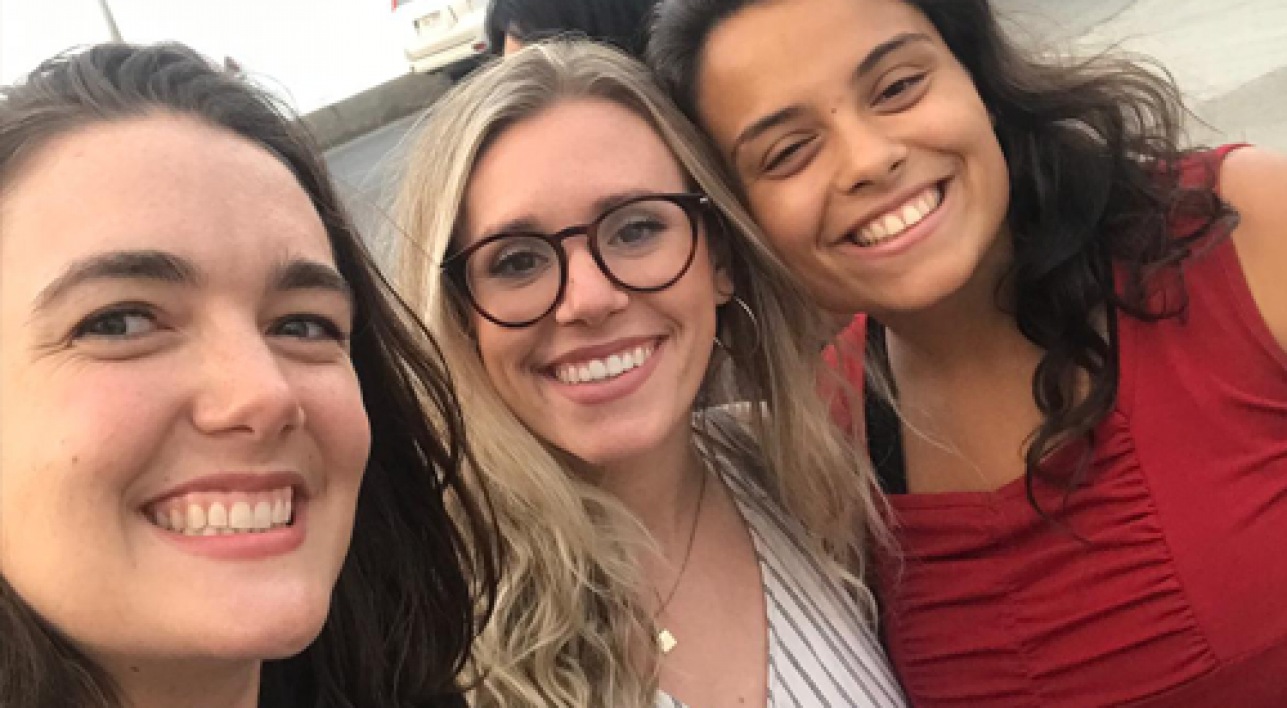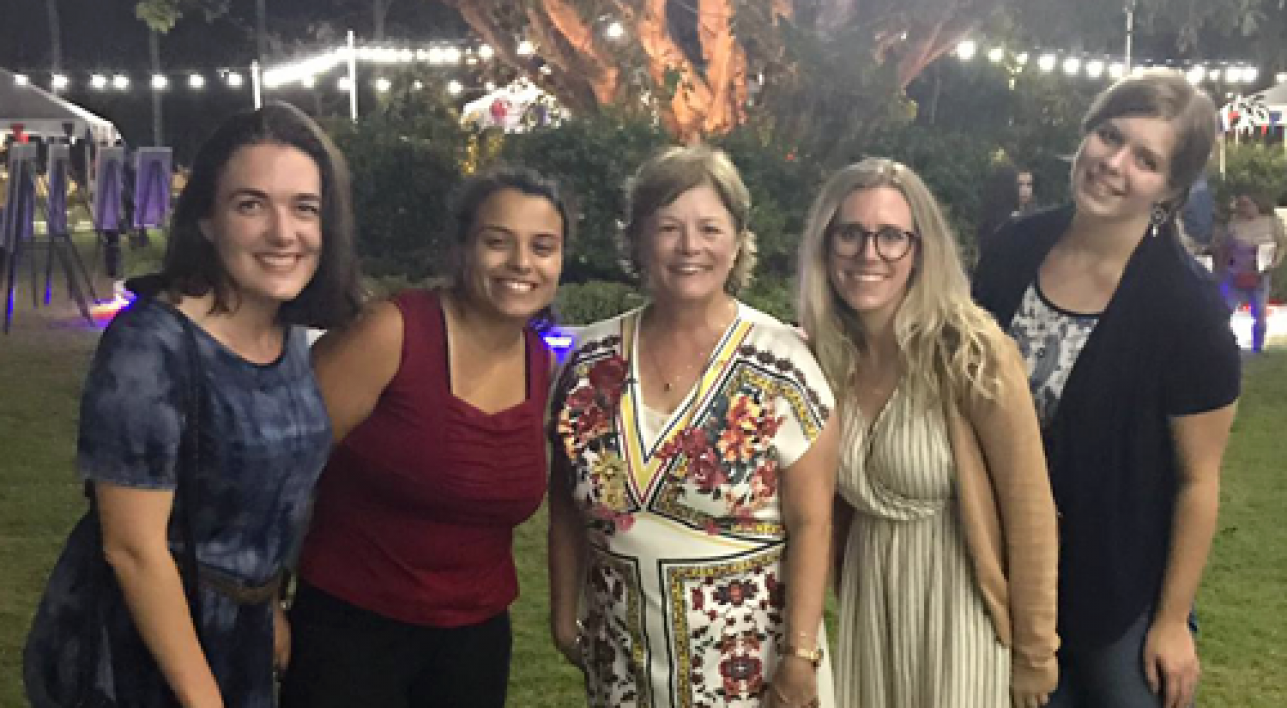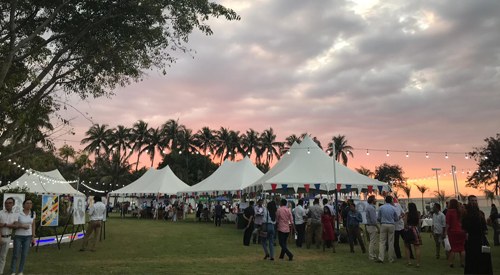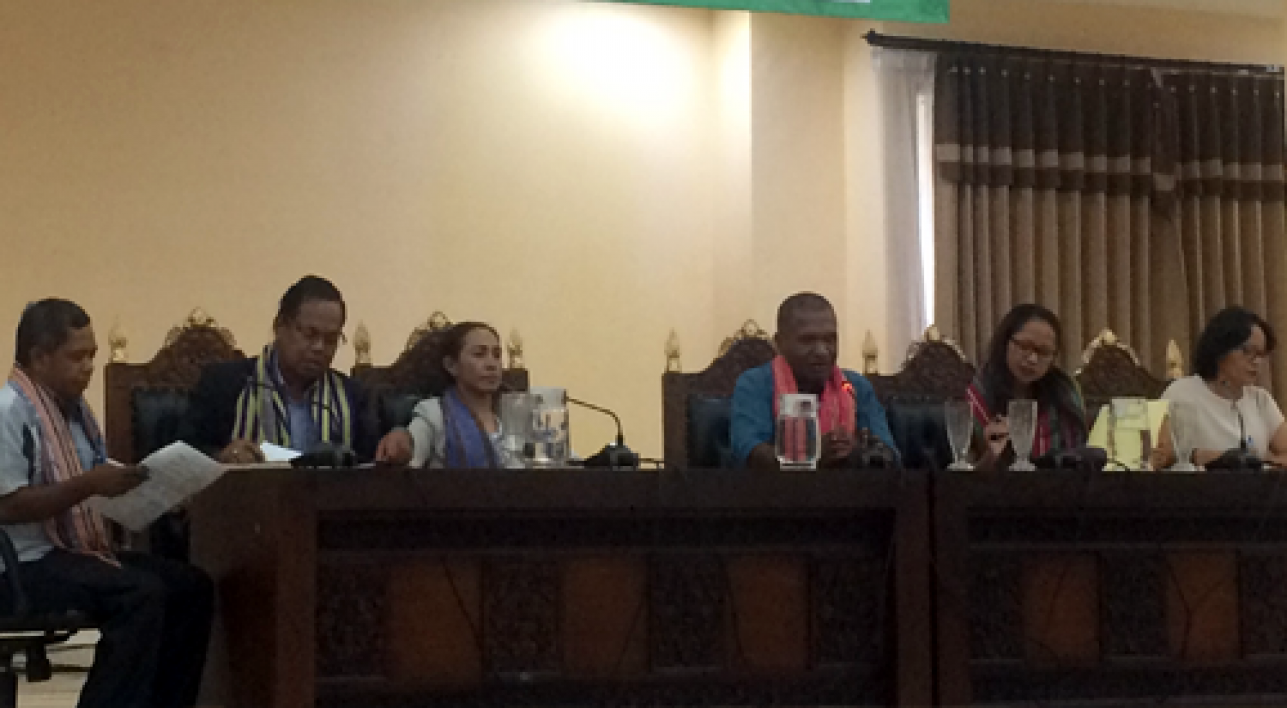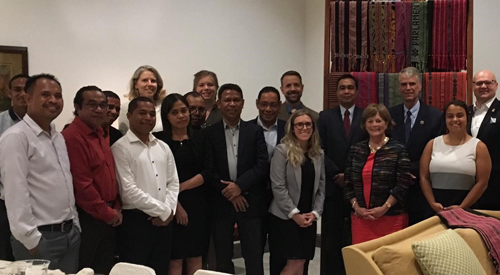International internship gives ASU Law students opportunity to impact democracy in developing country

This summer, a group of students at the Sandra Day O’Connor College of Law participated in the Timor-Leste internship program. Pictured from left: Alexandria Saquella, Isabella Ruggeri, Kara Woods and Courtney Yachanin.
For some college and graduate students, summer plans might include travel, hiking or spending some time on the beach. Perhaps they complete an internship. Or maybe study a new language. This past summer, a group of students at the Sandra Day O’Connor College of Law at Arizona State University did all of the above — while also helping a fledgling democracy further establish the rule of law.
“It was meaningful work,” said third-year ASU Law student Alexandria Saquella, who took part in the eight-week summer internship program in the Southeast Asian nation of Timor-Leste. “More so than any other job that I’ve had, I felt like I made a difference, like I made an impact.”
Professor Julia Fromholz, director of ASU Law’s International Rule of Law and Security Program, worked with the U.S. Embassy in Dili to launch the Timor-Leste internship program this year. Through an Australian organization called the Diplomacy Training Program (DTP), Fromholz was in Timor-Leste in 2018, leading training sessions for human rights activists in the Asia-Pacific region. While there, she saw the work of the Justice System Monitoring Program (JSMP), a Timorese nonprofit working to improve the judicial and legislative systems in Timor-Leste.
“I talked to JSMP about the potential of hosting interns, because we were looking for a place for students to intern overseas and I was impressed by their work,” Fromholz said. “Timor-Leste faces a host of challenging human rights issues, so I was confident that law students would have interesting work there. I had worked with U.S. Ambassador to Timor-Leste Kathleen Fitzpatrick during my time at the State Department, and she was enthusiastic about the idea of bringing talented ASU Law students to work in Dili.”
Three students — Saquella, Isabella Ruggeri and Kara Woods — spent the summer working with JSMP, and a fourth student, Courtney Yachanin, was paired with the Provedoria dos Direitos Humanos e Justiça, the Timor-Leste government’s human rights institution. A donation from the Jones Day Foundation to the International Rule of Law and Security Program helps provide internship opportunities for students overseas, and that funding covered the cost of the students’ flights, housing and living expenses.
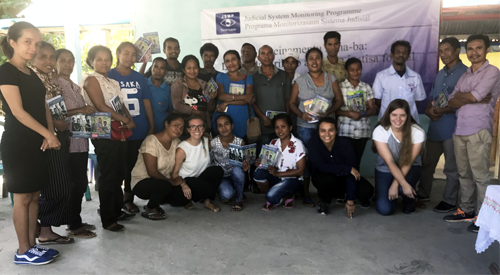
ASU Law students helped train community leaders on rights of women and children as part of the Timor-Leste internship program.
Timor-Leste, also known as East Timor, occupies the eastern portion of the island of Timor, between Australia and Indonesia. After centuries of Portuguese rule, it declared its independence in 1975, only to be invaded by Indonesia, which controls the western portion of the island, nine days later. After decades of violence, conflict and famine under Indonesian occupation, Timor-Leste gained internationally recognized independence in May 2002.
“It’s a new democracy and a small, poor country, and they’re still dealing with the aftermath of the Indonesian time,” Fromholz said. “They’re trying to tackle corruption and a lot of human rights issues.”
José Ramos-Horta, a leader of the East Timorese resistance during the Indonesian occupation, was a co-recipient of the 1996 Nobel Peace Prize for his efforts to bring a resolution to the conflict, and he later served as Timor-Leste’s prime minster from 2006 to 2007.
While leading the resistance, Ramos-Horta teamed with the Sydney, Australia-based University of New South Wales (UNSW), which is a partner of ASU Law through the university’s PLuS Alliance, to establish the Diplomacy Training Program in 1989. The Australian organization, still affiliated with UNSW law school, is committed to advancing human rights and empowering civil society in the Asia Pacific region.
On an ASU Law trip in summer 2018 to discuss collaboration with the University of New South Wales law school, Fromholz met with the Diplomacy Training Program’s executive director, Patrick Earle, which led to the idea of an internship program in Timor-Leste.
Opportunity knocks
Saquella had never ventured beyond North America, and admits she had not even heard of Timor-Leste before she attended an informational meeting with Fromholz. But she was fascinated by the opportunity.
“It sounded so interesting, giving a law student the ability to help in the development of a government in a developing country,” said Saquella, who had prior experience in the Arizona Legislature. “I’ve had a chance to see how bills are passed here and being able to do this kind of work in another country, it was just an amazing opportunity.”
Ruggeri, a second-year student from Brazil, came to ASU Law for its international law program. She has always wanted to specialize in that work, specifically advocating for the rights of individuals.
“I always wanted to do international work, and this was the perfect opportunity, especially since Timor-Leste and Brazil share a colonial history and an official language,” Ruggeri said. “I went to an information session and applied the next day.”
Yachanin, a second-year student, is focused on international environmental law.
“I want to get a degree in a field where I can actually impact the things that I care about,” she said.
She was searching for relevant work experience and jumped at the opportunity when Fromholz told her about Timor-Leste.
Woods, a second-year student, has a background in anthropology and was drawn to ASU Law for a number of reasons, including the Phoenix weather and relatively close location to her home in California. But what impressed her most were the career services department and the strong international law program.
“That was a big draw for me,” she said. “The International Rule of Law and Security program, specifically.”
She, too, was unfamiliar with Timor-Leste. But when she went to a lunch meeting to learn more about ASU Law’s programs in Washington, D.C., Fromholz mentioned the possibility of an overseas learning experience.
“I knew I didn't want to work in a firm doing just any kind of law work my first summer,” Woods said. “I wanted to get started on the international law track. So when the opportunity in Timor-Leste came up, I immediately knew that’s what I wanted to do.”
Challenging and high-level work
Fromholz helped the students get set up and introduced, then left them to their work.
“I accompanied them for the first 10 days to help them get settled in and to make sure that expectations on each side were clear,” she said. “In addition to introducing the ASU Law interns to many of my contacts there, I spoke with Timorese university students, journalists, lawyers and other audiences around town about challenges in strengthening adherence to the rule of law and about ASU Law’s program. After I left, I was delighted to read the interns’ updates over the rest of their time there about the extraordinary experiences they were having.”
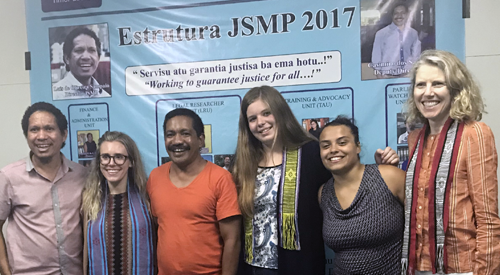
Professor Julia Fromholz (at right), director of ASU Law’s International Rule of Law and Security Program, worked with the U.S. Embassy in Dili to launch the Timor-Leste internship program this year.
The students handled a variety of important tasks, all aimed toward the goal of establishing a stronger rule of law and better protection of human rights.
Yachanin was tasked with researching the Convention on the Rights of Persons with Disabilities — a treaty drafted by the United Nations in 2006 — to encourage ratification by Timor-Leste. She formed recommendations on how to implement the convention’s policies and gave a presentation on disability rights to the South East Asia National Human Rights Institutions Forum.
Ruggeri conducted comparative international research.
“I drafted reports with recommendations on how to improve their current law on freedom of assembly and whether to adopt criminal defamation laws,” she said. “I also wrote a report on options about individuals recently acquitted under the insanity defense, following a concern about lack of separate facilities and resources for them. I also translated these reports from English to Portuguese, which is my first language and one of the two official languages in Timor-Leste.”
Despite her fluency in Portuguese, Ruggeri learned how difficult international communication can be.
“I thought being able to speak English and Portuguese would make it easier to communicate, but most of the population does not speak either of those languages and even the most basic daily things, like getting a taxi and explaining where to go turned into challenging situations.”
As a new country in 2002, Timor-Leste had signed the Rome Statute of the International Criminal Court, which established four core international crimes — genocide, crimes against humanity, war crimes and the crime of aggression — and rules governing the investigation and prosecution of those crimes. Woods’ job was to compare the set of laws that had been established in Timor-Leste since then, and ensure they were not in conflict with the country’s obligations under the Rome Statute.
“The work itself was challenging, because there are so many different things you need to consider when considering treaty obligations,” Woods said. “Who’s immune? Who’s not immune? What are the deportation or extradition laws? There are just a lot of different aspects to figure out. But it was engaging and challenging.”
Saquella was working under the Parliamentary Watch Project, which monitors legislation and suggests changes as bills work their way through Timor-Leste’s parliament. Her specific assignment involved anti-corruption legislation.
“I researched laws from different countries that are either similarly situated or more developed countries that Timor-Leste was wanting to use as guides,” she said. “In my end report, I provided all the research, and offered recommendations based on that research and how successful the laws had been in other countries.”
Feeling pressure from the gravity of the work, she turned to an invaluable ASU Law resource for assistance.
“I was so afraid of making a mistake or giving the wrong information,” she said. “But thankfully, we have amazing librarians here at the law school who know how to do international research. This is information that doesn’t just come up on Google. There are specific ways to find these laws and see how they’re applied. So I was communicating with our librarians a lot and they were incredibly helpful.”
A life-altering experience
It was a summer that none of the students will soon forget. Despite the intense work, they had time to make friends, improve their language skills and take in the beautiful scenery of Timor-Leste. They saw dolphins, went scuba diving, climbed mountains and visited remote villages.
“They were some of the most amazing experiences I’ve ever had,” Ruggeri said.
A variety of languages are spoken in Timor-Leste, including Tetum and Portuguese. The language barrier presented some challenges, but as the students learned basic phrases, they began forming friendships and expanding their social circles.
“Once we nailed down the greeting conventions, that changed the whole experience,” Woods said. “Because people opened up at that point, and they were willing to take us places and to talk with us. It made things much easier.”
The chance to live and work in a developing country, even for just eight weeks, convinced her she is on the right career path — pursuing policy and advocacy work on the international stage, as opposed to courtroom service and litigation.
Saquella said it was an invaluable experience.
“It opened a lot of doors,” she said, noting that once she added her Timor-Leste experience to her resume, she had the chance to interview for an externship at the State Department and landed a position with the Department of Homeland Security. “It gave me a cultural perspective that you won’t get unless you travel abroad and actually work for a country that's developing and the people there are trying to make their laws the best they can.”
Ruggeri said the experience has benefitted her both personally and professionally.
“I think the challenges that we faced and interactions with a very different reality and culture made me grow as a person,” she said. “Professionally, I realized how much I enjoy doing international human rights research and interacting with the international community, and how useful it can be in the right circumstances. I was also able to network with many people working in international development and gain experience working in the area in which I want to work.”
Fromholz said the two organizations the students worked with were very appreciative of their contributions and hope to have ASU Law interns return next summer.
“The support of Ambassador Fitzpatrick and her team at the U.S. Embassy in Timor-Leste made the experience even more unusual for the interns. They started their summer by dining at the ambassador’s residence with Timorese judges and prosecutors as well as a visiting U.S. federal judge and prosecutor. The Embassy’s Resident Legal Advisor team, David Lewen and Domingos Amaral, worked with JSMP and PDHJ before the interns arrived and included the interns in events during the summer. And at the end of the summer, Ambassador Fitzpatrick said she hoped that ASU Law would send more interns next summer,” Fromholz said. “We’re already working on that, and our first information session about next summer’s Timor-Leste program will take place in November.”
Any student considering a career in international law, Saquella says, should seize the opportunity.
“I don’t know if a lot of other schools offer experiences like this, but I’m very, very blessed and grateful that I ended up going to ASU Law.”
More Law, journalism and politics

ASU experts share insights on gender equality across the globe
International Women’s Day has its roots in the American labor movement. In 1908, 15,000 women in New York City marched to protest…

ASU Law to offer its JD part time and online, addressing critical legal shortages and public service
The Sandra Day O’Connor College of Law at Arizona State University, ranked 15th among the nation’s top public law schools,…

ASU launches nonpartisan Institute of Politics to inspire future public service leaders
Former Republican presidential nominee and Arizona native Barry Goldwater once wrote, "We have forgotten that a society…


